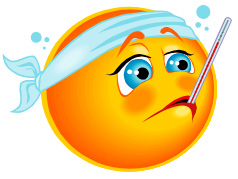The most effective way to decrease complications and reduce the impact of the flu is to get a preventative vaccine shot. The North American vaccine is developed each year to work against three strains of influenza virus, based on trends seen in the Southern Hemisphere. The best time for vaccination is early October to mid-November.
Certain people are at an increased risk of complications from the flu and should receive the vaccine. High-risk patients who should be vaccinated include those who:
- are aged 65 years or older
- live in a nursing home or chronic care facility
- have lung diseases (e.g., asthma, chronic obstructive pulmonary disease)
- have heart conditions (e.g., angina, congestive heart failure)
- have diabetes or other metabolic diseases
- have kidney problems
- have blood disorders (e.g., anemia)
- have weakened immune systems (e.g., are taking steroid medications, have cancer, or have HIV)
- are at high risk for complications and are traveling to areas where influenza is common
- are aged 6 months to 59 months
- are aged 6 months to 18 years and are taking long-term ASA therapy
- work in healthcare, such as doctors, nurses, and pharmacists
- have been diagnosed as suffering from morbid obesity
- are members of First Nations
Anyone who is in contact with high-risk populations (including health care workers) should also receive the vaccine. People who are not part of the high-risk groups but just want to avoid the flu can also get vaccinated. If you are currently sick with a low-grade fever, experts suggest that you should wait until you are better before you get the vaccine. If you do not have a fever, you do not have to wait.
Vaccinations are not recommended for children less than 6 months of age because their immune systems are too immature for the vaccine to work properly. People who have an egg or chicken protein allergy, an allergy to any of the ingredients of the vaccine (e.g., formaldehyde, gentamicin), a history of allergic reactions to the flu vaccine, or an acute illness should not receive the vaccine.
Simple frequent handwashing is also very effective at preventing both flus and colds. As well, teach your family to cough or sneeze into their sleeves, and lead by example!
Certain medications (e.g., zanamivir, oseltamivir) are also used in some cases to prevent the flu. Consult your doctor or pharmacist to determine whether you need a preventative medication, and which one is the right one for you.
There are many myths about what predisposes a person to catch a cold and what makes one person catch more colds than another. Factors that may increase the risk of catching a cold are fatigue, emotional stress, smoking, mid-phase of the menstrual cycle, and nasal allergies. Factors that do not increase the risk of catching a cold include cold body temperature (i.e., being out in the cold), general health status, eating habits, and enlarged tonsils.
Research studies do not show that echinacea helps to prevent colds. Vitamin C does not appear to protect people from catching colds, but it can shorten the duration of a cold by half a day. There is some evidence to suggest that vitamin C may reduce the risk of getting a cold for people in extreme circumstances such as marathon runners and soldiers in extremely cold conditions.
All material © 1996-2014 MediResource Inc. The contents herein are for informational purposes only. Always seek the advice of your physician or other qualified health provider with any questions you may have regarding a medical condition.


